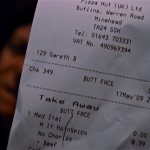
Many people just toss their receipts into the nearest rubbish bin, especially if they have paid cash, but receipts are actually very useful pieces of paper. Below I explain why and how they can save you money.
Budgeting
Obviously, to help you budget it is important to reconcile every item of expenditure with your bank account. So keeping receipts and regularly reviewing your expenditure will help to keep your finances on track.
Errors
As soon as you have completed a purchase check to make sure that all the purchased items were priced correctly and any offers or coupons were also applied correctly. It's much easier to get an error corrected at the time of purchase than try and do it days later.
Guarantees
More retailers are using the receipt as a guarantee, so you will need to keep this in a safe place in case of future problems with your purchase.
Coupons
Many businesses these days will print a coupon on the receipt to enable you to obtain a discount on your next visit. For example supermarkets often print petrol discount vouchers at the end of grocery receipts. Alternatively, vendors may well advertise discounts for other businesses such as take-away restaurants, as commonly found on the reverse of car park tickets.
Surveys
Many stores will have details of online surveys on their receipts, they may offer the chance of winning prizes, or obtaining a discount voucher for completion. These surveys are usually short and easy to complete so are well worth the effort.
Freebies
Sometimes when businesses are trying to promote a new product or service they may offer a free sample on your next visit or after you have collected a certain number of receipts.
Returns
Obviously, if for some reason you need to return the goods purchased then the only way to guarantee your money back is to produce the receipt.
Rebates
Some stores will have a price charter that will pay a rebate if the customer finds the same article at a cheaper price elsewhere. Obviously, you will need the receipt as proof of purchase.
Security
While receipts these days should only include the last four digits of any credit/debit card used it pays to shred them as a rule to help prevent identity fraud. The one time you don't is the one time that the vendor has used an old style machine which gives away all your precious information. Better safe than sorry.
Conclusion
Make sure you check and read everything you receive as part of a purchase, throwing things straight in the bin can cost you money. If there are receipts you need to keep and you don't want all the paper lying around, then just scan them into your computer, or take a photo of them with your smart phone for future reference.
photo by geese - Flickr